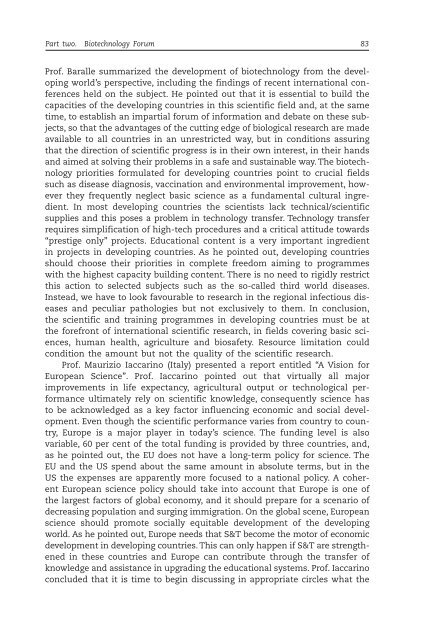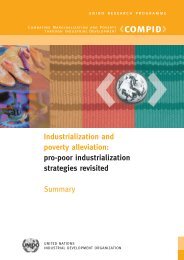TECHNOLOGY FORESIGHT SUMMIT - Unido
TECHNOLOGY FORESIGHT SUMMIT - Unido
TECHNOLOGY FORESIGHT SUMMIT - Unido
Create successful ePaper yourself
Turn your PDF publications into a flip-book with our unique Google optimized e-Paper software.
Part two. Biotechnology Forum 83<br />
Prof. Baralle summarized the development of biotechnology from the developing<br />
world’s perspective, including the findings of recent international conferences<br />
held on the subject. He pointed out that it is essential to build the<br />
capacities of the developing countries in this scientific field and, at the same<br />
time, to establish an impartial forum of information and debate on these subjects,<br />
so that the advantages of the cutting edge of biological research are made<br />
available to all countries in an unrestricted way, but in conditions assuring<br />
that the direction of scientific progress is in their own interest, in their hands<br />
and aimed at solving their problems in a safe and sustainable way. The biotechnology<br />
priorities formulated for developing countries point to crucial fields<br />
such as disease diagnosis, vaccination and environmental improvement, however<br />
they frequently neglect basic science as a fundamental cultural ingredient.<br />
In most developing countries the scientists lack technical/scientific<br />
supplies and this poses a problem in technology transfer. Technology transfer<br />
requires simplification of high-tech procedures and a critical attitude towards<br />
“prestige only” projects. Educational content is a very important ingredient<br />
in projects in developing countries. As he pointed out, developing countries<br />
should choose their priorities in complete freedom aiming to programmes<br />
with the highest capacity building content. There is no need to rigidly restrict<br />
this action to selected subjects such as the so-called third world diseases.<br />
Instead, we have to look favourable to research in the regional infectious diseases<br />
and peculiar pathologies but not exclusively to them. In conclusion,<br />
the scientific and training programmes in developing countries must be at<br />
the forefront of international scientific research, in fields covering basic sciences,<br />
human health, agriculture and biosafety. Resource limitation could<br />
condition the amount but not the quality of the scientific research.<br />
Prof. Maurizio Iaccarino (Italy) presented a report entitled “A Vision for<br />
European Science”. Prof. Iaccarino pointed out that virtually all major<br />
improvements in life expectancy, agricultural output or technological performance<br />
ultimately rely on scientific knowledge, consequently science has<br />
to be acknowledged as a key factor influencing economic and social development.<br />
Even though the scientific performance varies from country to country,<br />
Europe is a major player in today’s science. The funding level is also<br />
variable, 60 per cent of the total funding is provided by three countries, and,<br />
as he pointed out, the EU does not have a long-term policy for science. The<br />
EU and the US spend about the same amount in absolute terms, but in the<br />
US the expenses are apparently more focused to a national policy. A coherent<br />
European science policy should take into account that Europe is one of<br />
the largest factors of global economy, and it should prepare for a scenario of<br />
decreasing population and surging immigration. On the global scene, European<br />
science should promote socially equitable development of the developing<br />
world. As he pointed out, Europe needs that S&T become the motor of economic<br />
development in developing countries. This can only happen if S&T are strengthened<br />
in these countries and Europe can contribute through the transfer of<br />
knowledge and assistance in upgrading the educational systems. Prof. Iaccarino<br />
concluded that it is time to begin discussing in appropriate circles what the

















